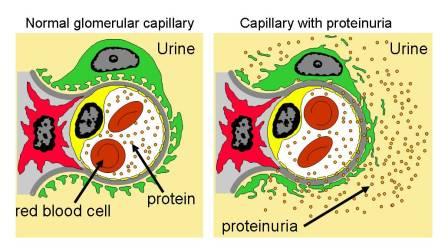 Search
Search
 Search
Search
 The clinical manifestations of polycystic kidney disease (PKD) are gradual enlargement of kidney cysts, back pains, high blood pressure, hematuria, proteinuria and renal damages. One of the typical symptoms is proteinuria (protein in urine) and there will be a lot of bubbles while urination.
The clinical manifestations of polycystic kidney disease (PKD) are gradual enlargement of kidney cysts, back pains, high blood pressure, hematuria, proteinuria and renal damages. One of the typical symptoms is proteinuria (protein in urine) and there will be a lot of bubbles while urination.
The formation of proteinuria has much to do with barrier function of the glomeruli and the re-absorption function of the renal tubules. Under normal circumstances, there is small amount of protein in urine (less than 150mg) and the protein qualitative examination is negative. When the protein leakage exceeds the normal amount, proteinuria can be detected in the routine urine test and if the daily protein leakage exceeds 3.5g, it is called massive proteinuria.
In case of PKD, proteinuria is mainly related to the tubular re-absorption function and that is why the protein in urine is in most cases around 1g/24h and it is mainly small molecular protein and there is little albumin. However since the multiple cysts in the kidneys will continue to enlarge and they will gradually oppress and replace normal renal tissues and when the glomeruli are damages and most kidney functions are affected, there will be large amount of protein in urine.
We all know that protein is necessary for maintaining normal life activities and building up the structure and tissues of the body, therefore long term protein leakage will cause malnutrition. What is worse, proteinuria will further aggravate renal damages and worsen the illness conditions, therefore proper treatments should be received timely. Otherwise the renal damages will become irreversible and the renal fibrosis will be worse. Serum creatinine will increase and the worsened illness condition will increase blood pressure and cause enlargement of the heart or even heart failure.
Hormones can help alleviate proteinuria in a short time, but the protein will once again appear in urine after a period of time especially under the inducements of colds, infections or fever. That is because the root cause of proteinuria---kidney damages are not treated. Therefore it is very important to take timely treatments once there is proteinuria or the illness condition will continue to deteriorate and become irreversible.
In a word, to treat proteinuria from the root, effective treatments should have the functions of controlling the growth rate of cysts, repairing kidney damages and improving kidney functions. In this regard, Chinese herbal medicines are good choice. Compared with hormones, Chinese medicines need relatively long time to have effects, but the effects are lasting and durable and will not cause much side effects as hormones do.
Active ingredients in herbal medicines can inactivate the cystic epithelial cells and inhibit continuous secretion of more fluid, on the other hand, it can soften the cyst wall and increase its permeability so that the cyst fluid will be re-absorbed into the blood vessels and be discharged along with blood circulation. After the application of herbal medicines for a period of time, the cysts will be shrunk or at least its growth rate will be slowed down. Of cause the smaller the cyst is, the effects are better. That is why early treatments are necessary.
Besides, Chinese herbal medicines have the functions of dilating blood vessels, anti-coagulation, anti-inflammation and degradation of extracellular matrix so as to improve ischemia and hypoxia in the kidneys and create a favorable environment for repairing damaged renal intrinsic cells and tissues and recover certain renal functions.